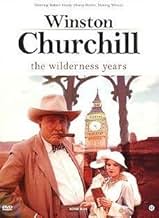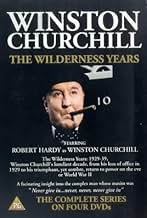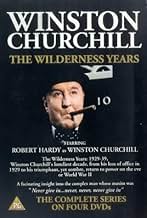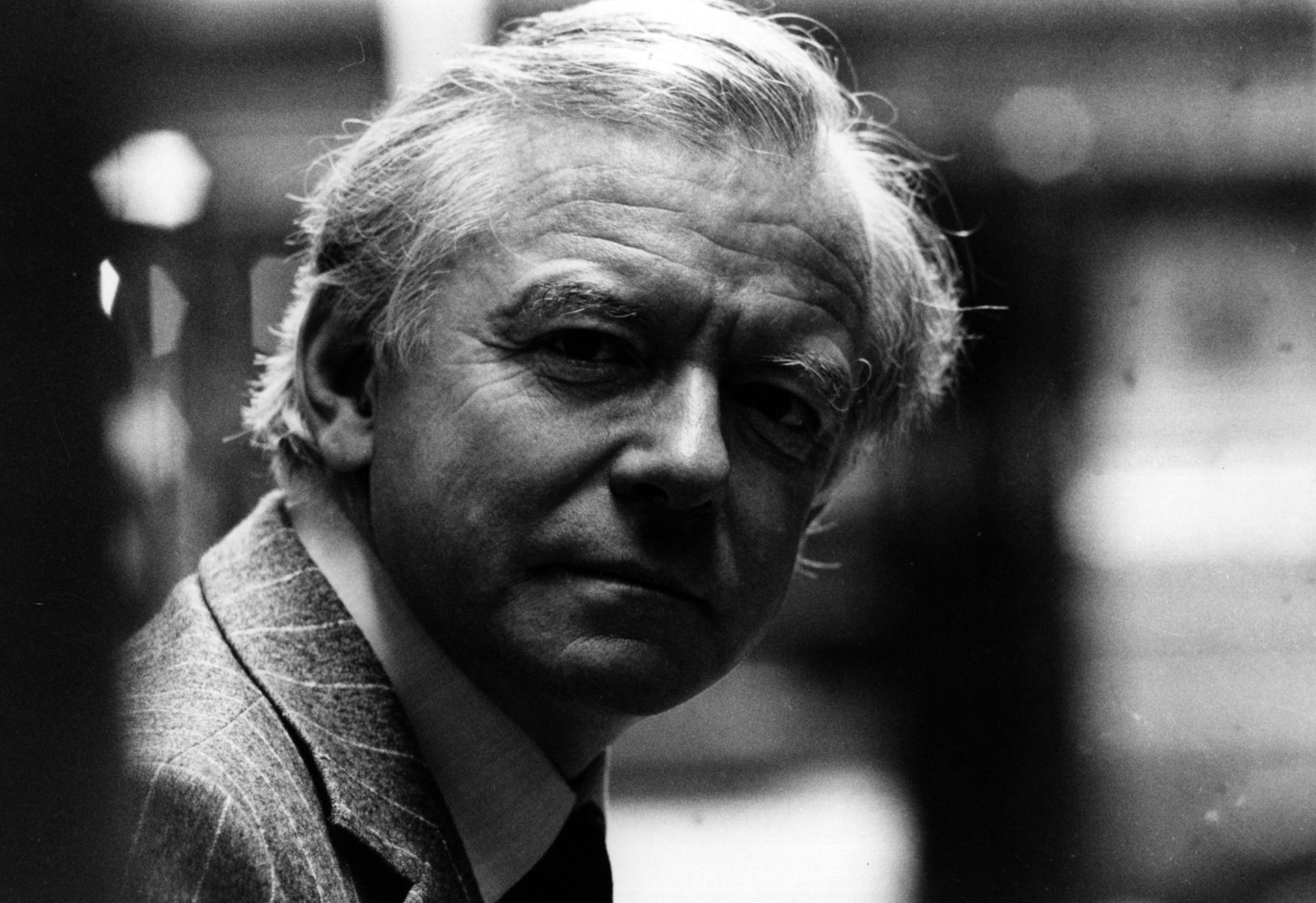Le sconfitte di un vincitore: Winston Churchill 1928-1939
Titolo originale: Winston Churchill: The Wilderness Years
- Mini serie TV
- 1981
- 1h
VALUTAZIONE IMDb
8,4/10
355
LA TUA VALUTAZIONE
Aggiungi una trama nella tua linguaThe story of Winston Churchill's life between 1929, when he lost his cabinet position, and 1939, when he joined Great Britain's War Cabinet - a period he described as the most difficult in h... Leggi tuttoThe story of Winston Churchill's life between 1929, when he lost his cabinet position, and 1939, when he joined Great Britain's War Cabinet - a period he described as the most difficult in his life.The story of Winston Churchill's life between 1929, when he lost his cabinet position, and 1939, when he joined Great Britain's War Cabinet - a period he described as the most difficult in his life.
- Nominato ai 8 BAFTA Award
- 1 vittoria e 8 candidature totali
Sfoglia gli episodi
Recensioni in evidenza
10mc3852
This mini-series is truly a classic, the best historical drama that I have ever seen. There are slow spots whenever the action moves away from Churchill, or else the mini-series travels over-familiar territory like German preparations for World War II, but these points are simply quibbles. You literally hear the clash of arms, the ring of combat and the roars of the crowd as Churchill battles one foe after another, often defeated but never giving up. I swear, this movie will give you chills with the sense of history being made.
PBS broadcast the mini-series in 1986. Drew Middleton, a WWII correspondent, said that it had the force of Greek tragedy, Churchill the antagonist while everyone--friends, family, political opponents--became part of the chorus. Robert Hardy performs that role magnificently. He has done good work in "Middlemarch", "Elizabeth R" and "All Creatures Great and Small", but those roles are simply dwarfed by his Churchill. Alternately raging, noble, petty-minded, sulking, humorous, sly and generous, Hardy's Churchill is a character of Shakespearean proportions. Rarely does an actor match the emotional force of an historical giant, but Hardy succeeds. Over eight hours, Hardy is never dull.
Still, a great hero is nothing without opposition. When Hardy did a one-man show of Churchill, I was terribly disappointed. Hardy was still doing what he did before but, without context and response, his performance seemed little more than a recital of greatest hits. It is really the entire cast, uniformly excellent, that lifts this mini-series above the usual attempt at history. Nigel Havers does an entertaining and ultimately tragic performance as Randolph, Churchill's beloved son, who is already being ruined by his father's indulgence and overblown expectations. Peter Barkworth as Samuel Baldwin is the ultimate politician, ever so slyly maneuvering with one honest insincerity after another so that, through a bewildering series of missteps that no one but he can understand, he gets exactly what he wants. But Churchill's greatest opponent is Neville Chamberlain. Eric Porter plays him full of arrogance and incomprehension, already marked by the flaws which Hitler will brilliantly exploit. Yet the gradual breakdown, his ultimate realization that his best efforts have led to nothing but ruin, gives Chamberlain a measure of tragic dignity that makes him sympathetic despite the historical record. Churchill is a triumphant Henry V, but Porter plays the blinded hero of his own Greek tragedy to perfection.
An aside. The opening and closing music of this mini-series matches with the greatest music ever made for the movies. Starting mysteriously dim and obscure, it swells into a mighty torrent of sound and victory, at once enthralling to the ear and a perfect encapsulation of the mini-series. If Churchill had had a taste for such music, he would have loved it. Comparable to Strauss' "Thus Spake Zarathustra" but infinitely better, the theme music really conveys the character of Churchill and of the times.
PBS broadcast the mini-series in 1986. Drew Middleton, a WWII correspondent, said that it had the force of Greek tragedy, Churchill the antagonist while everyone--friends, family, political opponents--became part of the chorus. Robert Hardy performs that role magnificently. He has done good work in "Middlemarch", "Elizabeth R" and "All Creatures Great and Small", but those roles are simply dwarfed by his Churchill. Alternately raging, noble, petty-minded, sulking, humorous, sly and generous, Hardy's Churchill is a character of Shakespearean proportions. Rarely does an actor match the emotional force of an historical giant, but Hardy succeeds. Over eight hours, Hardy is never dull.
Still, a great hero is nothing without opposition. When Hardy did a one-man show of Churchill, I was terribly disappointed. Hardy was still doing what he did before but, without context and response, his performance seemed little more than a recital of greatest hits. It is really the entire cast, uniformly excellent, that lifts this mini-series above the usual attempt at history. Nigel Havers does an entertaining and ultimately tragic performance as Randolph, Churchill's beloved son, who is already being ruined by his father's indulgence and overblown expectations. Peter Barkworth as Samuel Baldwin is the ultimate politician, ever so slyly maneuvering with one honest insincerity after another so that, through a bewildering series of missteps that no one but he can understand, he gets exactly what he wants. But Churchill's greatest opponent is Neville Chamberlain. Eric Porter plays him full of arrogance and incomprehension, already marked by the flaws which Hitler will brilliantly exploit. Yet the gradual breakdown, his ultimate realization that his best efforts have led to nothing but ruin, gives Chamberlain a measure of tragic dignity that makes him sympathetic despite the historical record. Churchill is a triumphant Henry V, but Porter plays the blinded hero of his own Greek tragedy to perfection.
An aside. The opening and closing music of this mini-series matches with the greatest music ever made for the movies. Starting mysteriously dim and obscure, it swells into a mighty torrent of sound and victory, at once enthralling to the ear and a perfect encapsulation of the mini-series. If Churchill had had a taste for such music, he would have loved it. Comparable to Strauss' "Thus Spake Zarathustra" but infinitely better, the theme music really conveys the character of Churchill and of the times.
Very accurate telling of Churchill's life while out of office and his struggle to warn the UK of the Nazi peril. Hardy puts his soul into it, though he comes off as whiny or pouting at times rather than as the British bulldog Churchill was. Fascinating stuff!
Great performance from Robert Hardy, also Sian Phillips as stoical Clementine, Nigel Havers as impecunious son Randolph, Tim Piggot-Smith as Churchill cheerleader Brendan Bracken, Peter Barkworth as wily Stanley Baldwin, Eric Porter a trusting Neville Chamberlain, Edward Woodward a devious Samuel Hoare, Tony Mathews an intense Anthony Eden. Only Richard Murdoch's hawkish, almost Churchillian Lord Halifax is completely off beam, presumably to make it easier to cast Chamberlain as villain of the piece.
There are no bad episodes, it dipped slightly in the third and fourth which mostly concerned India and cotton, rather a distraction from the main theme. My favourite, very amusing, scene is in the first episode. Chamberlain, supported by Hoare, tries to persuade Baldwin to remove Churchill from the Treasury. Baldwin slyly asks Chamberlain "who would you most like to see as Chancellor", to which he could only reply that he hasn't given the matter a great deal of thought. An honest answer could only have been himself.
My only criticism is about some of the later dialogue, which displays the oft used device of portraying people in black and white for dramatic effect. I must declare a family connection with Chamberlain, my grandfather knew him well and was his chief canvasser in the 1920s. Did he really say (episode 5) "Churchill is the warmonger, not Hitler"? His statement (episode 7) that "I'm instructing the defence services to continue to reduce their estimates" is tendentious fiction. Military spending rose every year from 110.9 million Pounds in 1933 to 266 million in 1939.
However harshly films and television treat Baldwin and Chamberlain, one can bet all Lombard Street to a China orange (excuse my 1930s lingo) that Labour's record is shown in a good light or glossed over. In March 1936 Labour opposed increases in armaments, their amendment to the budget decried "security in national armaments alone and intensifies the ruinous arms race between the nations" Well known Labour figures voting for this amendment included Attlee, Bevan, Dalton, Greenwood, Morrison, Shinwell. I just thought I'd mention it in the interests of balance.
There are no bad episodes, it dipped slightly in the third and fourth which mostly concerned India and cotton, rather a distraction from the main theme. My favourite, very amusing, scene is in the first episode. Chamberlain, supported by Hoare, tries to persuade Baldwin to remove Churchill from the Treasury. Baldwin slyly asks Chamberlain "who would you most like to see as Chancellor", to which he could only reply that he hasn't given the matter a great deal of thought. An honest answer could only have been himself.
My only criticism is about some of the later dialogue, which displays the oft used device of portraying people in black and white for dramatic effect. I must declare a family connection with Chamberlain, my grandfather knew him well and was his chief canvasser in the 1920s. Did he really say (episode 5) "Churchill is the warmonger, not Hitler"? His statement (episode 7) that "I'm instructing the defence services to continue to reduce their estimates" is tendentious fiction. Military spending rose every year from 110.9 million Pounds in 1933 to 266 million in 1939.
However harshly films and television treat Baldwin and Chamberlain, one can bet all Lombard Street to a China orange (excuse my 1930s lingo) that Labour's record is shown in a good light or glossed over. In March 1936 Labour opposed increases in armaments, their amendment to the budget decried "security in national armaments alone and intensifies the ruinous arms race between the nations" Well known Labour figures voting for this amendment included Attlee, Bevan, Dalton, Greenwood, Morrison, Shinwell. I just thought I'd mention it in the interests of balance.
Robert Hardy is the most convincing imitator of Churchill I've seen. He is wisely depicted here with his foibles - his rashness and ineptitude in areas beyond his ken, such as the stock market and raising offspring - as well as strengths. And it's a treat to see Siân Phillips and Tim Pigott-Smith supporting.
Here's a story well-told, with interesting locations, too, from Churchill's home at Chartwell, in UK, to the Arizona desert. For anyone with an appreciation of the titanic events that shaped World War II, "The Wilderness Years" provides invaluable background, not only for Churchill as a major player, but for the others - Baldwin, Beaverbrook, Chamberlain, as well as movers and shakers with unfamiliar names, like the oily Sir Samuel Hoare, who manipulated and connived on behalf of appeasement.
Despite the mediocre print I highly recommend "The Wilderness Years" as an enriching docudrama that deserves repeated viewing. My only regret is, that Robert Hardy did not continue the Churchill saga through the war years. What a smashing tale that would have been!
Here's a story well-told, with interesting locations, too, from Churchill's home at Chartwell, in UK, to the Arizona desert. For anyone with an appreciation of the titanic events that shaped World War II, "The Wilderness Years" provides invaluable background, not only for Churchill as a major player, but for the others - Baldwin, Beaverbrook, Chamberlain, as well as movers and shakers with unfamiliar names, like the oily Sir Samuel Hoare, who manipulated and connived on behalf of appeasement.
Despite the mediocre print I highly recommend "The Wilderness Years" as an enriching docudrama that deserves repeated viewing. My only regret is, that Robert Hardy did not continue the Churchill saga through the war years. What a smashing tale that would have been!
Have to agree with everything that the others have said before me. This is a superb, outstanding drama and the kind of thing that good modern history lessons should be built around in school. One or two others have described it as flawless - I agree: and some of the dramatic touches added by the lighting are almost genius. One thing that some people may not know is that some of it - particularly some of the outdoor scenes but also I suspect, some appropriate indoor scenes - were shot at Chartwell, Churchill's country house which is preserved for the public and has a warm and friendly, home "family" atmosphere. And yes, Churchill did indeed get a kick out of building a wall or two there, as well as painting some interesting pictures - his art is much more highly regarded by the critics than Hitler's!!
Lo sapevi?
- QuizA year before he died, Robert Hardy was interviewed by actor James Murray about this series for "Robert Hardy Remembers Churchill's Wilderness Years" at the Theatre Royal, Winchester, as part of The Winchester Festival 2016, with all proceeds going to The Murray Parish Trust in raising money for a new children's Emergency Department at Southampton University Hospital.
- BlooperIn the first episode, "Down and Out," Churchill is seen giving a speech in the USA in 1929. A US flag is visible to his right, and the field (with the stars) is visible. The stars are in staggered rows, meaning it is a 50 star US flag. A 48-star flag, as in use in 1929, would have even rows of stars (six rows of eight).
- ConnessioniReferenced in 28 Up (1984)
I più visti
Accedi per valutare e creare un elenco di titoli salvati per ottenere consigli personalizzati
Dettagli
- Data di uscita
- Paese di origine
- Lingua
- Celebre anche come
- Winston Churchill: Os Anos Agitados
- Luoghi delle riprese
- Azienda produttrice
- Vedi altri crediti dell’azienda su IMDbPro
Contribuisci a questa pagina
Suggerisci una modifica o aggiungi i contenuti mancanti

Divario superiore
By what name was Le sconfitte di un vincitore: Winston Churchill 1928-1939 (1981) officially released in India in English?
Rispondi

































